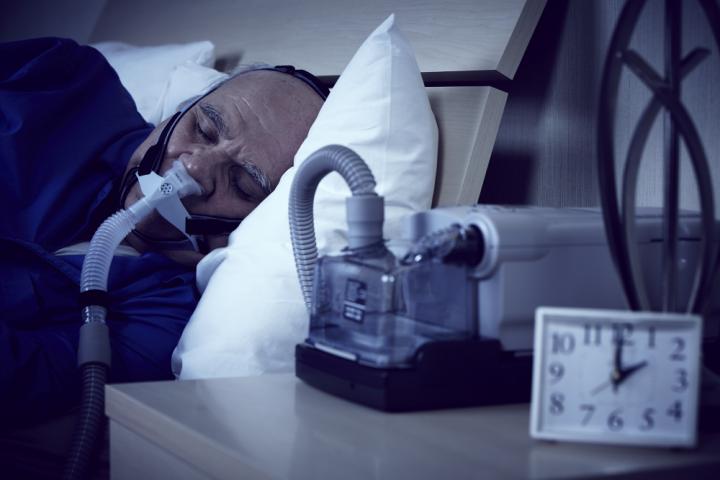Increased PAP usage associated with reduced acute care, emergency department visits

Credit: American Academy of Sleep Medicine
DARIEN, IL – Treating patients with moderate or severe obstructive sleep apnea with positive airway pressure (PAP) therapy is associated with reduced acute care visits and health care expenditures, according to a recent study.
Every one-hour increase in PAP usage per night was associated with an 8% decrease in inpatient visits (rate ratio 0.92) and a 4% decrease in overall acute care visits (RR 0.96). PAP adherence also was associated with a significantly lower number of emergency department visits and inpatient stays, and increasing PAP usage was associated with a lower likelihood of having positive costs from these visits. Among patients with emergency department costs, PAP adherence was associated with 27% lower costs.
“While it’s not surprising that treatment of moderate or severe sleep apnea is good for overall health, the fact that PAP treatment in a relatively short time frame was associated with an impact of this significance was unexpected,” said lead author Dr. Douglas B. Kirsch, medical director of sleep medicine at Atrium Health in Charlotte, North Carolina, and clinical professor in the Department of Medicine at UNC School of Medicine. “In addition, while many older research trials suggested patients were not often adherent to PAP therapy, this study of more than 1,000 patients suggests that with appropriate education and support, a significant majority of patients are likely to use PAP therapy in an effective manner.”
The study was published in the Sept. 15 issue of the Journal of Clinical Sleep Medicine.
Nearly 30 million adults in the U.S. have obstructive sleep apnea, a chronic disease that involves the repeated collapse of the upper airway during sleep. Common warning signs include snoring and excessive daytime sleepiness. PAP therapy uses mild levels of air pressure, provided through a mask, to keep the throat open during sleep.
The authors conducted a retrospective cohort study of adult patients who initiated PAP therapy after a diagnosis of moderate or severe sleep apnea at a large integrated health system between 2014-2016. The study consisted of 1,098 patients (average age 55.7 years, 66.3% male) who had at least 18 months of available data after PAP therapy was initiated. Treatment adherence was defined as using PAP more than four hours per night for at least 70 percent of the studied nights.
Results show that 60% of the study population was adherent to PAP therapy, and the overall average percentage of nights with PAP usage of more than four hours was nearly 70%. The average use on nights when PAP was used was 6.4 hours per night, and the average use on all nights was 5.3 hours.
“Patients, clinicians and health systems should recognize that effective treatment of sleep apnea is valuable in both an individual’s health and as a mechanism to keep overall medical costs lower for the patient and the health system,” said Kirsch. “This study suggests that a significant majority of patients not only tolerate but are adherent to therapy over an 18-month time frame when given effective education and support.”
###
The authors reported no conflicts of interest.
To request a copy of, “Association of Positive Airway Pressure Use With Acute Care Utilization and Costs,” or to arrange an interview with the lead author or an AASM spokesperson, please contact Communications Coordinator Corinne Lederhouse at 630-737-9700, ext. 9366, or [email protected].
The monthly, peer-reviewed Journal of Clinical Sleep Medicine is the official publication of the American Academy of Sleep Medicine, a professional membership society that improves sleep health and promotes high quality, patient-centered care through advocacy, education, strategic research, and practice standards (aasm.org). The AASM encourages patients to talk to their doctor about sleep problems and visit SleepEducation.org for more information about sleep, including a searchable directory of AASM-accredited sleep centers.
Media Contact
Corinne Lederhouse
[email protected]
630-737-9700
Original Source
https:/
Related Journal Article
http://dx.




